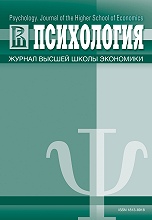Российские авторы в ведущих международных психологических журналах: библиометрический анализ
Аннотация
В статье проводится библиометрический анализ российских статей и их авторов, опубликованных в ведущих международных психологических журналах (с наибольшим значением импакт-фактора) с 2000 по 2015 г. Выборка составила 482 статьи российских авторов. Результаты анализа показали, что в последние несколько лет наблюдается рост количества российских публикаций в ведущих международных психологических журналах. Однако темп этого роста в России ниже по сравнению с другими странами, имеющими сходные элементы академической системы. Заметное место среди российских публикаций последних лет занимают публикации сотрудников лабораторий, созданных в рамках программы «мегагрантов» (почти каждая пятая статья в 2015 г.). Естественно-научный сегмент российской психологической науки и смежных областей лучше представлен в ведущих международных психологических журналах по сравнению с социальным и прикладным сегментами. По этой же тематической области в последние годы наблюдается больший рост количества публикаций. Многие авторы, имеющие наибольшее количество статей в ведущих международных психологических журналах, являются иностранцами либо имеют второе место работы в зарубежной организации. Среди авторов крайне мало систематически публикующих статьи в ведущих журналах из года в год. Лишь шестеро авторов систематически публиковали статьи в ведущих журналах на протяжении периода с 2008 по 2015 г. Однако в последние пять лет наблюдается рост российских авторов (до 29 человек), систематически публикующих статьи в ведущих журналах.
Скачивания
Литература
2. Abramo, G., D’Angelo, C. A., & Solazzi, M. (2011). The relationship between scientists’ research performance and the degree of internationalization of their research. Scientometrics, 86(3), 629-643. https://doi.org/10.1007/s11192-010-0284-7
3. Global Deception Res Team. (2006). A world of lies. Journal of Cross-Cultural Psychology, 37(1), 60-74. https://doi.org/10.1177/0022022105282295
4. Hu, Z., Chen, C., & Liu, Z. (2014). How are collaboration and productivity correlated at various career stages of scientists? Scientometrics, 101(2), 1553-1564. https://doi.org/10.1007/s11192-014-1323-6
5. Kwiek, M. (2016). The European research elite: a cross-national study of highly productive academics in 11 countries. Higher Education, 71(3), 379-397. https://doi.org/10.1007/s10734-015-9910-x
6. Lotka, A. J. (1926). The frequency distribution of scientific productivity. Journal of the Washington Academy of Science, 16, 317-323.
7. Massarani, L. (2013, July 13). Brazil’s science investment reaches record high. Nature. https://doi.org/10.1038/nature.2013.13495
8. Mingers, J., & Leydesdorff, L. (2015). A review of theory and practice in scientometrics. European Journal of Operational Research, 246(1), 1-19. https://doi.org/10.1016/j.ejor.2015.04.002
9. O’Boyle Jr., E., & Aguinis, H. (2012). The best and the rest: Revisiting the norm of normality of individual performance. Personnel Psychology, 65(1), 79-119. https://doi.org/10.1111/j.1744-6570.2011.01239.x
10. Pislyakov, V. V. (2007). Metody otsenki nauchnogo znaniya po pokazatelyam tsitirovaniya [Methods of assessment of the scientific knowlegde according to the citation index]. Sotsiologicheskii Zhurnal, 1, 128-140.
11. Pislyakov, V. V. (2014). Bibliometricheskie indikatory v resursakh Thomson Reuters [Bibliometric indicators in the resources Thomson Reuters]. In M. A. Akoev (Ed.), Rukovodstvo po naukometrii: indikatory razvitiya nauki i tekhnologii [A handbook in scientometrics: indicators of development of science and technology] (pp. 75-109). Ekaterinburg: Ural University.
12. Podsakoff, P. M., MacKenzie, S. B., Podsakoff, N. P., & Bachrach, D. G. (2008). Scholarly influence in the field of management: a bibliometric analysis of the determinants of university and author impact in the management literature in the past quarter century. Journal of Management, 34(4), 641-720. https://doi.org/10.1177/0149206308319533
13. Ruiz-Castillo, J., & Costas, R. (2014). The skewness of scientific productivity. Journal of Informetrics, 8(4), 917-934. https://doi.org/10.1016/j.joi.2014.09.006
14. Rupp, D. E., Hoffman, B. J., Bischof, D., Byham, W., Collins, L., Gibbons, A., … Thornton, G. (2015). Guidelines and ethical considerations for assessment center operations. Journal of Management, 41(4), 1244-1273. https://doi.org/10.1177/0149206314567780





